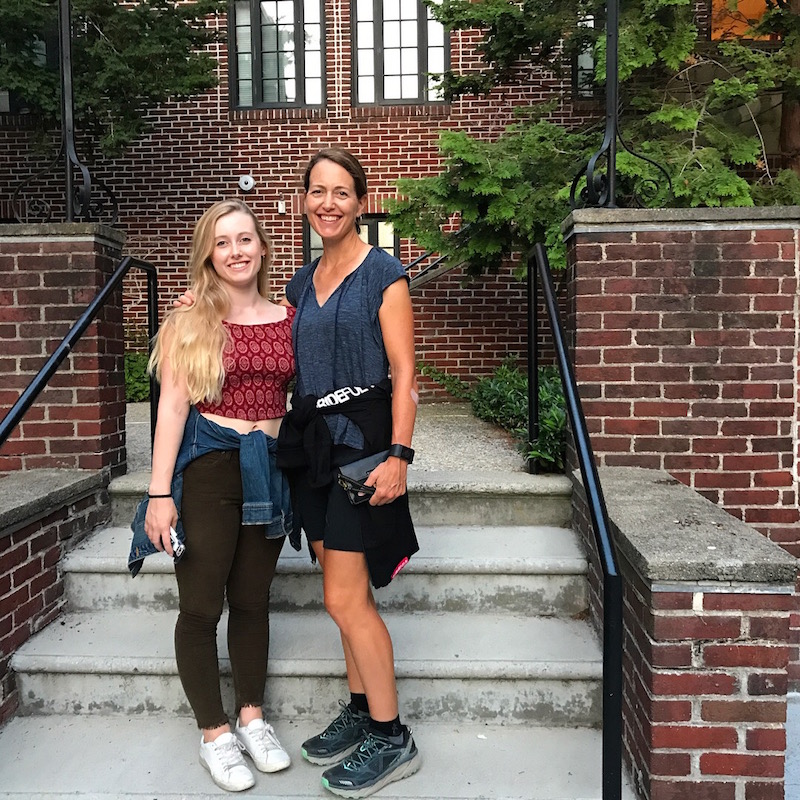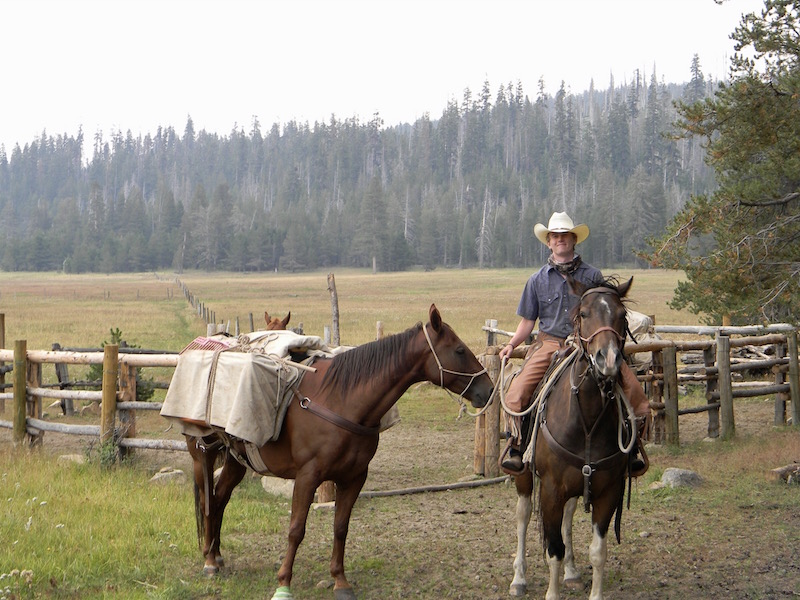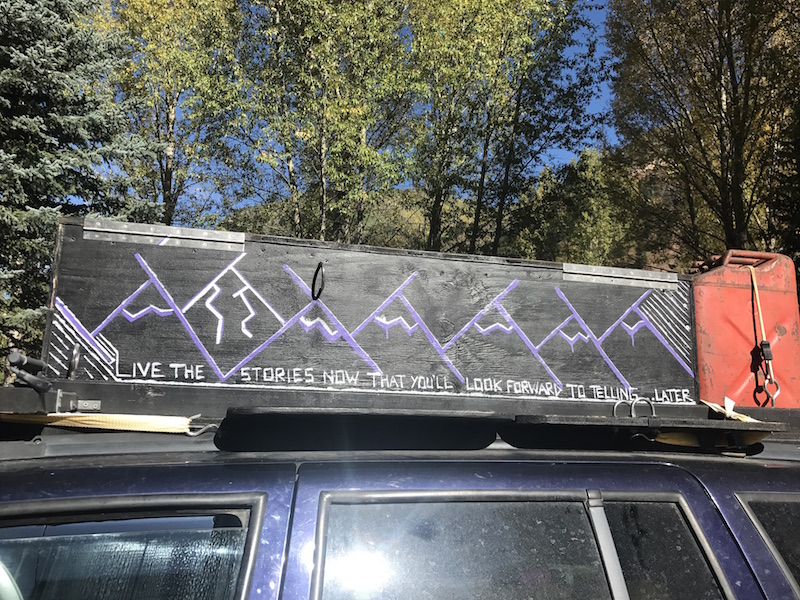I wrote this post last week and held off publishing it. Given the state of the world, with so many struggling from natural disasters and poverty or threatened by geopolitical forces, my issues and self-help advice seemed trivial; I felt self-conscious sharing so-called problems when real, serious problems loom everywhere. And then the massacre in Vegas unfolded. The news is so painful and depressing, leaving us feeling powerless and vulnerable. Ultimately I concluded that seeking wellness and happiness always matters and can be a coping mechanism for dealing with doomsday feelings of vulnerability and helplessness. That’s why I’m sharing this post. I hope we all redouble efforts to work for change, help others and resolve conflicts nonviolently.
I lay in bed past 7:30 in the morning, even later than Morgan, who’s usually the one to come downstairs after coffee is made.
On this morning sometime in mid-September, a little more than a week following that 100-mile strugglefest I wrote about in the last post, I felt no desire or need to get out of bed. I didn’t want to run and had put my training schedule on hiatus to take a break post-ultra. Big projects that had taken a lot of time and filled me with a sense of purpose, like my book and board service, were in the rearview mirror, along with a summer full of invigorating outdoor chores.
Partly I was exhausted from the push of transitioning the kids to school, moving back to California and doing Run Rabbit Run 100. But fatigue alone didn’t generate this zombie state. A case of the stupids and the blues seized my brain, while lethargy and stiffness took over my body, leaving me with no motivation or confidence to get anything done beyond caring for my coaching clients. A past-due article, which should take only half a day to write if I had the gumption, gnawed at my conscience, but I kept pushing the assignment away. The idea of sitting at my laptop for fifteen focused minutes and composing even one paragraph gave me a stomach cramp of nerves fueled by feelings of inadequacy. I couldn’t run, couldn’t write, couldn’t do much more than laundry.
I could feel and hear the house’s emptiness—one kid settled into college, the other starting junior year at boarding school. Our four-bedroom Bay Area home felt ridiculously large, mildly neglected and at times even spooky after living in a cozy Airstream in Colorado all summer.
I opened the news on my phone to scan the headlines. Seriously, how can it be that every single day the news seems worse, the leader of our country picking ever more divisive and dangerous fights? I couldn’t stomach the news, so I switched to my other main daily news source—the one that usually captures my attention—UltraRunnerPodcast’s Daily News. But again, I only felt like processing the headlines. I had left my drive and identity as a runner somewhere back in Colorado.
All I felt capable of doing was opening a thick book from the bedside table, Truly Madly Guilty,by Liane Moriarty (author of Big Little Lies, which was made into the HBO series that hooked me earlier in the year). Hiding under our duvet, allowing only enough daylight through to illuminate the pages, I immersed myself in these characters’ lives. It crossed my mind that my ability to wallow in bed was a luxury—a privilege—for which I should be grateful, but that realization only made me feel more lame.
After several mornings in a row under the covers with that novel, it hit me: This is what post-100-mile-ultra, midlife, empty-nesting transition feels like.
The fact I’m writing this means I feel better now. I’m writing from Colorado, where we returned for the month, so those awkward weeks back in the Bay Area in September seem like a hazy blip, but that phase served as a reminder that transitions can be hard. Working from home—isolated and unscheduled—can be hard. Finishing an ultra and ending the structured peak training that led up to it can feel deflating or disorienting.
What’s more, seeing the kids grow up and gain independence feels bittersweet; my fulfilling maternal role became a void, and their aging reflected my own.
I did a few things that made me feel better and helped with those transitions, which I share below in case you’ve ever struggled with a transition, perhaps after a training cycle, a job change or a move, or after your kids moved away.

My daughter Colly, 19, moving into her sophomore year at the Rhode Island School of Design.

My son Kyle, 16, starting his junior year at The Thacher School with a horse camping trip. If anyone wonders why we sent our kids to boarding school for high school and consequently became early empty-nesters, this is one reason why–we all love this school’s horse program and its outdoor ed. My family has a multigenerational history with the school, so it’s like a second home and tradition.
Don’t pressure yourself to run. Hike or do another activity instead, and run according to feel and desire. Until just this past week, running felt awful whenever I’d try some short, easy-pace runs. Slow and achy, short of breath, I faced the irony that completing a 100-miler can make you feel as if you’re in the worst shape of your life in the weeks following. I met Errol “The Rocket” Jones for one of our Lake Merritt loops, and he emailed me the following golden advice afterward, implicitly reminding that not going easy post-ultra can lead to injury:
“You deserve and have earned a break, but you won’t take it on your own accord. It’s a somewhat typical mentality of the dyed-in-wool ultrarunner, who has to be broken or reduced before they’ll take a step back, then laments the time off we were forced to take because we refused to heed the signs, do the right thing, at the right time. The signals are there, loud and clear. But since you won’t do it of your own volition I’m issuing you a mandate and giving you absolution to take it easy, enjoy your running for a bit. Don’t have a plan, just wake up each day for a while and decide. I’m not saying don’t run—I’m one of the foremost proponents of everyday running if possible—but let the feeling wash over you. Don’t plan on running any races, at least for a month or two, unless the urge is really irresistible and strikes you. Then you’ll know that you’re right and it’s time to gear up.”
Take a week or two totally off from running, then get back to it very gradually; if you feel like it, use the time off for walking, swimming, yoga or physical therapy—activities that help work through stiffness and fatigue, and that feel restorative, not depleting. Or, just rest if that’s what you really feel like doing.
Structure work at home. This New York Time article, on how to work from home effectively, reminded me of habits for productivity that I had let slip, such as: get up and get dressed as if you could meet someone outside the home. (I’m guilty of spending entire days unshowered in running clothes, or in the ratty T-shirt I slept in.) Keep your work space distinct and separate from where you sleep. Don’t multitask; focus on one thing at a time. I got a tomato timer app—a timer for the “pomodoro technique” that prompts you to work for 25 minutes solid and then take a 5-minute break—and it helped get me out of the habit of toggling to Facebook or wandering into the kitchen for a snack anytime I tried to write a paragraph.
Nurture relationships. Lots of studies have confirmed that happiness comes from relationships, along with good health and meaningful experiences, rather than from material stuff. I felt lonely and disconnected returning to our hometown of Piedmont, where my community ties have withered, so I forced myself to reach out to some old friends and rekindle contact, and to invite our neighbors over for dinner, and felt so much better after those get-togethers. I also felt closer to my husband Morgan and endeavored to show appreciation by planning and doing fun stuff together. Committed relationships take work and should never be taken for granted.
Find meaningful work. Coaching feels most meaningful and satisfying right now, so I’m concentrating on improving and building my work with clients. Freelance writing, less so, so I’m taking a break and not forcing it. I also reached out to a nonprofit that I care about and offered my service starting this winter when I’m back in the Bay Area, so that I can volunteer in the community in a significant way. Certain house projects suddenly feel worthwhile, so I’m psyched to dive into them, perhaps because they’ll satisfy a desire for hands-on and nurturing work.
Be a lifelong learner. Earlier, when I was moping around in bed, I browsed the web in search of a resource or class on something I’ve long wanted to study—equine med and horsemanship. I found an excellent course on horse physiology and management, and over the past few weeks I’ve been engrossed in this horse course, saving it as a special treat to do at day’s end. Also, since the nonprofit I plan to volunteer for involves a lot of Spanish-speaking kids and their parents, I decided to take up Spanish again and endeavor to get back to a conversational level. For about 30 minutes a day, I do a lesson on the Babbel app and read News in Slow Spanish.
Set a new training goal. Don’t get on Ultrasignup the day after an ultra, especially a disappointing one, and impulsively sign up for an upcoming race (“redemption races” usually lead to more disappointment or frustration). Take a couple of weeks or more to figure out what inspires you, and how you would like to spend the weeks prior to it in training. Then find a race that genuinely excites you. You should feel as excited about the 12 or more weeks of training leading up to it as for the race itself; otherwise, you likely are outcome-oriented—more focused on the results of the race, not the process of training for it—and may be setting yourself up for failure or burnout.
For me, inspiration hit when Eric Schranz and I interviewed Run Rabbit Run 100 winner Courtney Dauwalter for Ultrarunnerpodcast (episode here). I’m impressed by her versatility—her ability to win high-altitude mountain ultras and also to excel at timed flat ultras. After months in Colorado that have made me feel more like a hiker than a real runner, I want to regain my steady-running stamina and some speed in these legs, so I’ll get back to speedwork and train for our local Thanksgiving 5K.
Courtney made me reflect on the 24-hour event I did in 2015. Could I do that again, and do as well or even beat my prior performance? The event, which I did on Summer Solstice, also takes place on New Year’s Eve (and the NYE version is considered more difficult due to fewer hours of daylight and colder weather). Hmm….New Year’s Eve spent running around Crissy Field in San Francisco, with lots of people there offering support and a few friends also signed up to do it. I felt excited thinking about it, and about running flatter, steadier training runs to prepare for it.
What a cool way to end the year. I’m in!
In case you missed it: Eric and I also recorded an UltraRunnerPodcast episode last month full of training and race-day advice, on the topic “How to make your race day ‘perfect.'” Have a listen.

Random sign I spotted on a car near a trailhead last week. Good advice!

Thank you for this post. I just finished my first ultra last Sunday and are having some “blues” ! I definitely needed to read this and will incorporate some of these techniques!
Thanks for this post, Sarah. I’ve been self-employed for 20 years and can’t tell you how many times I’ve gone down the hall to my office in my sleep attire!
I’m exhausted from the cumulative effects of the outrages du jour. So much suffering countered by total lack of empathy.
Running is a refuge from it and I’m grateful for that.